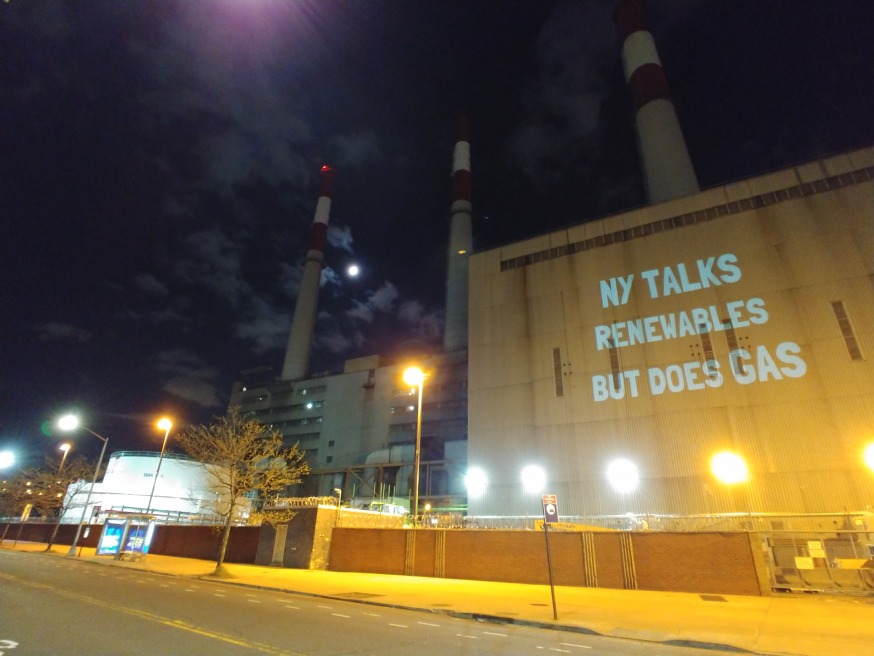
Activists of Nuclear New York project messages onto Ravenswood Generating Station in Queens during Earth Day last week. (Photo by Dietmar Detering)
April 30, 2021 Op-ed by Dietmar Detering
The decision to close Indian Point, the nuclear plant located 35 miles north of NYC, is wrongheaded, and will result in more pollution for residents of western Queens—setting New York back decades on climate action.
One might think that with passage of New York State’s celebrated Climate Leadership and Community Protection Act (CLCPA) in late 2019, polluting power plants like Ravenswood and Astoria generating stations in Queens would soon be retired.
After all, the CLCPA requires decarbonization of our grid and champions environmental justice. Instead, however, the state is shutting down its largest source of carbon-free energy and burning more fracked gas:
In 2017, Governor Cuomo, with the support of Riverkeeper and other big green groups, strong-armed Entergy to prematurely close the Indian Point nuclear energy plant, located north of our city on the Hudson River.
The first of the two reactors on-site was shuttered last year; the other will close tonight. Doing so will wipe out 16.7 terawatt-hours of annual carbon-free electricity from New York’s grid. That’s 2.5 times the energy generated by every solar panel and wind turbine throughout the state.
Fossil fuels will swell to 90 percent of all downstate generation. According to Riverkeeper and some state officials, renewables and energy efficiency are replacing Indian Point. However, real-time records from New York’s Independent System Operation (NYISO) prove this to be false. Gas use jumped after the first reactor shut down, despite a pandemic-induced reduction in demand.
This should come as no surprise considering that two massive new fracked gas plants were built specifically for this purpose: CPV Valley and Cricket Valley Energy.
In fact, Cricket Valley fired up last March, just days before the first Indian Point reactor shut down. When the last reactor closes, old fossil fuel plants in densely populated metro areas, especially Queens, may need to ramp up too.
The CLCPA is supposed to cut emissions, move the state to carbon-free electricity by 2040, and protect public health. But in year one of the law, New York lurched backwards on each of these goals.
Residents of Astoria and Long Island City already know first-hand why their communities are labeled “Asthma Alley.” Closing Indian Point means that they will have to suffer longer. Moreover, the planet will have to wait longer for New York’s greenhouse gas emissions to go down.
Riverkeeper’s nonsensical drumbeat of radiation, melt-downs, and terrorist threats simply do not match the reality of safe, reliable electricity generation by Indian Point for decades.
In fact, the facility’s remaining reactor just achieved a 752-day world record for longest continuous operation. Other plants of similar caliber in the U.S. have obtained approvals to operate for decades more. Removing Indian Point from service is a travesty.
CLCPA’s first disastrous year shows that New York cannot afford to make the same mistake again.
California has built six times the solar and wind capacity of New York, and Germany has spent a half trillion Euros on renewables. Yet both remain inextricably tied to fossil fuels because they decided to shun carbon-free nuclear power. Will New York follow in their failing footsteps by sacrificing the state’s remaining nuclear fleet?
Whether disingenuous or profoundly naïve, the reckless demand for “100 percent renewables” and demonization of nuclear power has brought more fracked gas to New York. Meanwhile, the fossil fuel industry is laughing all the way to the bank.
Dietmar Detering lives with his family in Sunnyside. He is part of Nuclear New York (www.NuclearNY.org), which unites environmentalists from across the state to advocate for nuclear energy as a key technology to protect climate, nature, and air quality. Nuclear New York is a project of Community Studies of NY, Inc, a 501(c)3 charity and is funded by contributions from individuals.
10 Comments







Who benefits from Indian Point closure?
– those who spent $1.5 billion and $1 billion respectively to build Cricket Valley, and CPV Valley
– Riverkeeper, who is fighting with the local community (that they destroyed) to secure half of the $15 million community fund.
Who loses?
– the planet
– Queens residents
Get over it librals
“Hopefully, Cuomo’s replacement will have knowledge and foresight” Comedy gold right there sir.
So nuclear power is now to be eulogized despite all the well known risks (think Chernobyl, Fukishima and 3 mile island disasters)!!?. Nuclear melt downs make climate change seem like a walk in the park by comparison. The disasterous risks associated with nuclear reactors were well known long before climate change concerns replaced nuclear power as the urgent issue of the day. Its also the reason why no nuclear power has been commissioned in the US in over 50 years. Like the singular fixation on Covid to the detriment of all other medical risks that haven’t gone away we cannot see everything just through the lens of climate change. Perhaps if we can tamper down the hysteria and adopted a more balanced risk based approach leveraging interim shorter term energy solutions this will allow the stability to pivot to sustainable green energy solutions in the long term. I just can’t believe that anyway would think nuclear power is somehow a preferable alternative to gas or oil given humanity’s deadly brushes with it.
Michelle: Nuclear energy is by far the safest of all dependable forms of electricity generation, en par with wind and solar, which are intermittent and take up a lot space and raw materials. NASA looked into this 2013 and determined that nuclear energy has saved over 1.8 million lives by displacing fossil fuels. The disasters you mention are few, have killed very few people (Fukushima and TMI have killed none), and Indian Point is safer than the reactors at Fukushima and cannot even compare to the Chernobyl design. Your depiction of nuclear energy, while far removed from reality, is very powerful emotionally and keeps guaranteeing huge wins to fossil fuels.
I fully support nuclear energy, but that plant was designed and built back when computers weighed as much as a car and took up a whole floor of a building for less computing power than a pocket calculator. Maybe replace it with a Generation III reactor.
If we had not listened to the “No Nukes” celebrity crowd of the late 70s and stopped building nuclear plants, by now the US would be very close to carbon-free. The “environmentalist’s”overly emotional reactions often have negative consequences.
Dietmar hats off to you sir. I’m delighted that someone is reporting on this issue. Well done! Thanks for the nuclearny link I’ve been looking for a group of like minded people.
You make many valid points but at the end of the day, I’m glad Indian Point is closing. The fact that there aren’t good alternatives in place isn’t a good enough reason to keep it open; there has been ample time for those in charge to prepare. Instead of lamenting the inevitable, focus on the future. Hopefully, Cuomo’s replacement will have knowledge and foresight and we can progress smoothly into the 21st century.
SuperWittySmitty: That’s a remarkable position to take. If you are both against Indian Point and also against the fossil fuel being the replacement, are you pro black-outs? Banking on better energy sources some time in the future won’t keep the lights on today. NYISO knew that in 2017, and that’s why the closure of Indian Point was delayed long enough so that new giant fossil fuel plants could be built first.